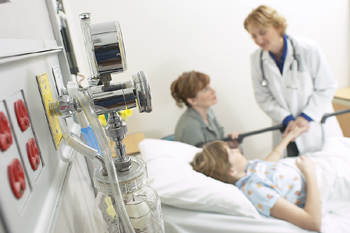Adolescents and Confidentiality: No Magic Messages
 ARLINGTON, VA. -- Physicians who care frequently for adolescent patients are still searching for the best ways to discuss confidentiality. ARLINGTON, VA. -- Physicians who care frequently for adolescent patients are still searching for the best ways to discuss confidentiality.
Dr. Carol A. Ford offered this assessment in a poster at the annual meeting of the Society for Adolescent Medicine. She and her associates reported on a survey of SAM members in which they asked clinicians to describe whether and how they would discuss confidentiality during a routine visit with a new 15-year-old female patient. Clinicians were also asked if they could guarantee confidentiality to patients receiving chlamydia testing.
About 80% of the 258 SAM members whose responses were included in the study (most eligible respondents were physicians) said there was a 76-100% chance they would discuss confidentiality with the adolescent. They cited numerous reasons why they would not, including concerns about the patient's competency, a focus on non-sensitive issues, and time limitations.
The providers' descriptions of exactly how they would discuss confidentiality varied so much that there appears to be no magic message. "These are people who spend their lives caring for adolescents. A lot of them are working in specialized clinics, and still, most of them can't figure out [how best to discuss confidentiality]. They're using a variety of strategies," Dr. Ford said in an interview after the meeting.
Many appear to be addressing confidentiality--and its limitations--in a general context, saying, for instance, that discussions will be confidential unless "what you say tells me that you or someone else is in danger."
A significant number, however, said they're increasingly structuring their messages to facilitate parental involvement. "Physicians have always encouraged teens to talk to their parents, but it looks like over time, they've really become more directly involved in trying to promote parent communication," said Dr. Ford of the University of North Carolina at Chapel Hill.
One respondent's strategy, for instance, included the message that "sometimes it really helps if your mothers/parents know exactly the problems you are facing ... How would you feel if I asked you to talk about this with your mother! parents? Would you like me to help you explain this situation to your mother/parents?"
When it came to STD testing, only about one-third said they could provide confidential chlamydia testing all the time; 45% said they have limited ability and 17% reported no ability to provide confidential chlamydia testing. Dr. Ford said she doesn't have the data to analyze this variation. It is clear, though, that those who could guarantee confidentiality "tended to be not in private practice but in clinics, health departments, or other special settings" where it's easier to set up special payment systems and other "labor-intensive" methods for ensuring confidentiality.
Those who said they could not guarantee confidential testing most often cited billing and reimbursement issues as the reason.
In a separate poster, Dr. Ford and her associates reported that, in private practice, confidentiality dearly influences the willingness of sexually active adolescents to consent to STD testing.
They surveyed almost 350 sexually active patients, aged 15-24, who visited two pediatric private practices in North Carolina. Patients were asked whether they'd agree to a urine test under three different conditions.
Overall, 92% of the patients said that they would agree to urine-based STD testing if they were told their parents would not find out they were tested. Almost 40% said they'd do so if their parents might know, and 35% said they'd agree if they were told their patients would know. |